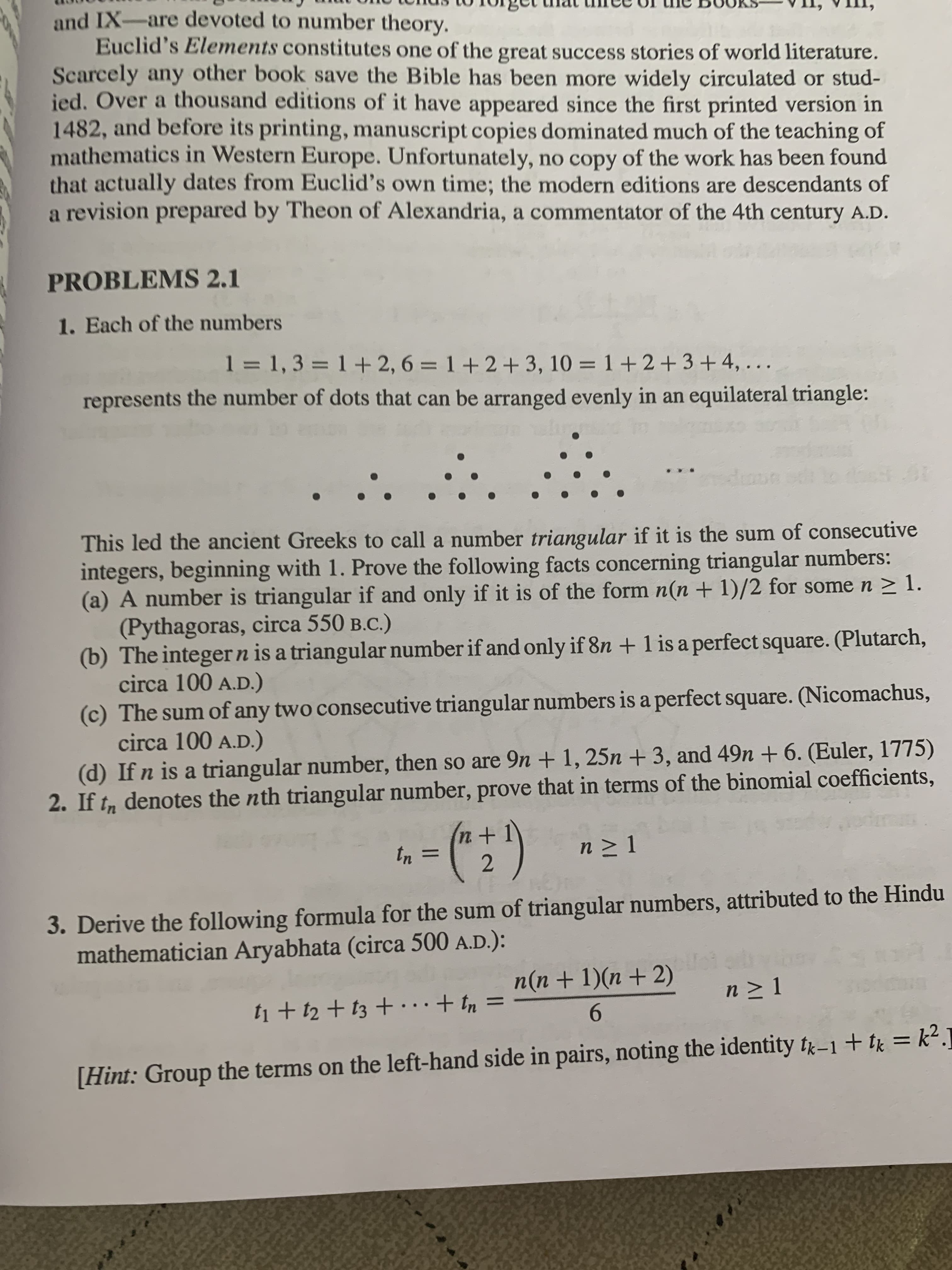1. Each of the numbers 1 = 1, 3 = 1 + 2, 6 = 1+ 2+ 3, 10 = 1 + 2 + 3+4, ... represents the number of dots that can be arranged evenly in an equilateral triangle: This led the ancient Greeks to call a number triangular if it is the sum of consecutive integers, beginning with 1. Prove the following facts concerning triangular numbers: (a) A number is triangular if and only if it is of the form n(n + 1)/2 for some n > 1. (Pythagoras, circa 550 B.C.) (b) The integern is a triangular number if and only if 8n + 1 is a perfect square. (Plutarch, circa 100 A.D.) (c) The sum of any two consecutive triangular numbers is a perfect square. (Nicomachus, circa 100 A.D.) (d) If n is a triangular number, then so are 9n + 1, 25n + 3, and 49n + 6. (Euler, 1775) anouo thot in terms of the binomial coefficients,
1. Each of the numbers 1 = 1, 3 = 1 + 2, 6 = 1+ 2+ 3, 10 = 1 + 2 + 3+4, ... represents the number of dots that can be arranged evenly in an equilateral triangle: This led the ancient Greeks to call a number triangular if it is the sum of consecutive integers, beginning with 1. Prove the following facts concerning triangular numbers: (a) A number is triangular if and only if it is of the form n(n + 1)/2 for some n > 1. (Pythagoras, circa 550 B.C.) (b) The integern is a triangular number if and only if 8n + 1 is a perfect square. (Plutarch, circa 100 A.D.) (c) The sum of any two consecutive triangular numbers is a perfect square. (Nicomachus, circa 100 A.D.) (d) If n is a triangular number, then so are 9n + 1, 25n + 3, and 49n + 6. (Euler, 1775) anouo thot in terms of the binomial coefficients,
Elementary Geometry For College Students, 7e
7th Edition
ISBN:9781337614085
Author:Alexander, Daniel C.; Koeberlein, Geralyn M.
Publisher:Alexander, Daniel C.; Koeberlein, Geralyn M.
Chapter2: Parallel Lines
Section2.5: Convex Polygons
Problem 41E
Related questions
Topic Video
Question
2.1 question 1 please

Transcribed Image Text:1. Each of the numbers
1 = 1, 3 = 1 + 2, 6 = 1+ 2+ 3, 10 = 1 + 2 + 3+4, ...
represents the number of dots that can be arranged evenly in an equilateral triangle:
This led the ancient Greeks to call a number triangular if it is the sum of consecutive
integers, beginning with 1. Prove the following facts concerning triangular numbers:
(a) A number is triangular if and only if it is of the form n(n + 1)/2 for some n > 1.
(Pythagoras, circa 550 B.C.)
(b) The integern is a triangular number if and only if 8n + 1 is a perfect square. (Plutarch,
circa 100 A.D.)
(c) The sum of any two consecutive triangular numbers is a perfect square. (Nicomachus,
circa 100 A.D.)
(d) If n is a triangular number, then so are 9n + 1, 25n + 3, and 49n + 6. (Euler, 1775)
anouo thot in terms of the binomial coefficients,
Expert Solution
This question has been solved!
Explore an expertly crafted, step-by-step solution for a thorough understanding of key concepts.
This is a popular solution!
Trending now
This is a popular solution!
Step by step
Solved in 4 steps

Knowledge Booster
Learn more about
Need a deep-dive on the concept behind this application? Look no further. Learn more about this topic, advanced-math and related others by exploring similar questions and additional content below.Recommended textbooks for you

Elementary Geometry For College Students, 7e
Geometry
ISBN:
9781337614085
Author:
Alexander, Daniel C.; Koeberlein, Geralyn M.
Publisher:
Cengage,

Linear Algebra: A Modern Introduction
Algebra
ISBN:
9781285463247
Author:
David Poole
Publisher:
Cengage Learning

Elementary Geometry for College Students
Geometry
ISBN:
9781285195698
Author:
Daniel C. Alexander, Geralyn M. Koeberlein
Publisher:
Cengage Learning

Elementary Geometry For College Students, 7e
Geometry
ISBN:
9781337614085
Author:
Alexander, Daniel C.; Koeberlein, Geralyn M.
Publisher:
Cengage,

Linear Algebra: A Modern Introduction
Algebra
ISBN:
9781285463247
Author:
David Poole
Publisher:
Cengage Learning

Elementary Geometry for College Students
Geometry
ISBN:
9781285195698
Author:
Daniel C. Alexander, Geralyn M. Koeberlein
Publisher:
Cengage Learning

Algebra & Trigonometry with Analytic Geometry
Algebra
ISBN:
9781133382119
Author:
Swokowski
Publisher:
Cengage

Algebra: Structure And Method, Book 1
Algebra
ISBN:
9780395977224
Author:
Richard G. Brown, Mary P. Dolciani, Robert H. Sorgenfrey, William L. Cole
Publisher:
McDougal Littell